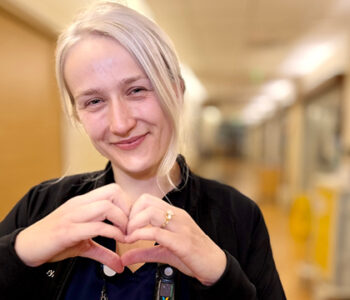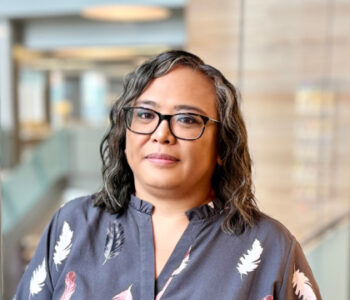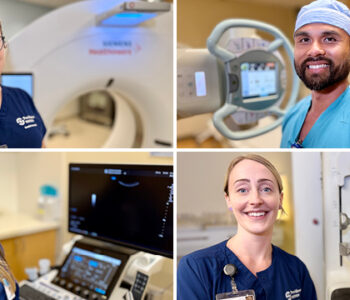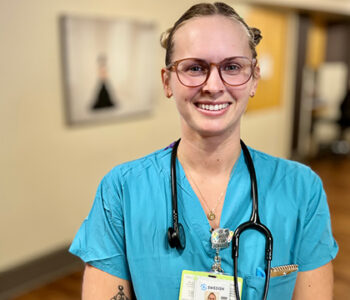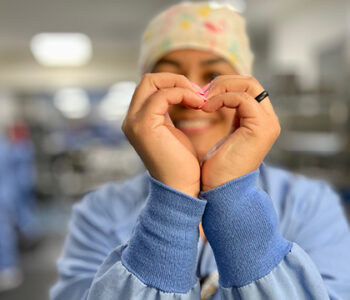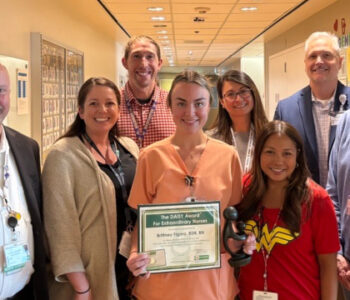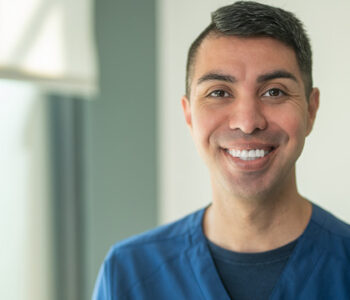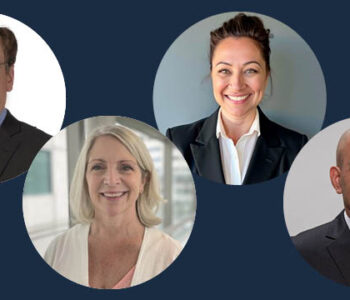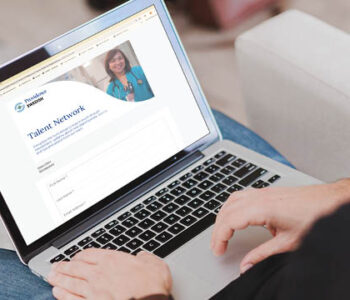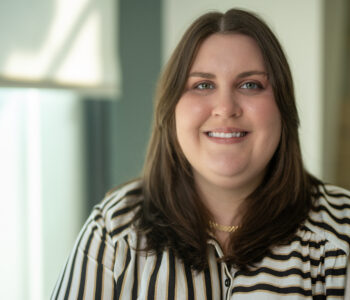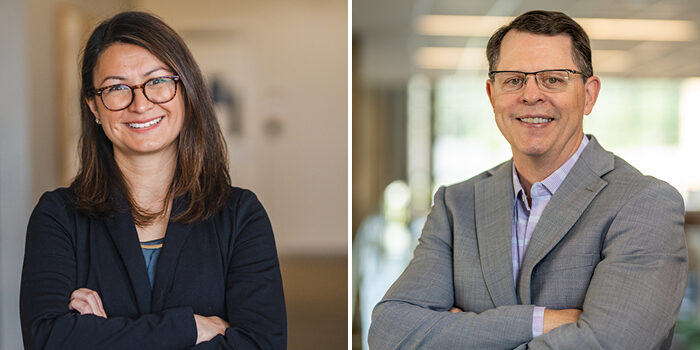 Job Spotlight
Job Spotlight
Chief nursing officers: prioritizing teamwork and community
Our chief nursing officers are critical to our family of organizations, nurturing and helping new and established nurses grow in their careers, implementing policies and procedures, integrating new technologies and much more every day. If nurse leadership is something you’re interested in, read on to hear what it’s like from two of our Puget Sound CNOs.
Path to leadership
For Renee Rassilyer-Bomers, chief nursing officer for the Puget Sound Central Service Area, twenty-one years at Providence Swedish has proved to her that excellent caregiving is about community. “I was born at Swedish and grew up in the area,” Renee says. “I began my journey here as a phlebotomist and became a nurse technician. I’ve stayed ever since.” Before becoming a CNO, Renee was a clinical nurse specialist and the chief quality officer. As a clinical instructor for Seattle University, Renee has been to most other facilities in the area, but for her, “my home is Swedish.”
Brian Trickel has had a similar career path. Now the CNO for the Swedish Issaquah and Redmond Campuses, as well as the associate vice president of the Swedish Ballard and Issaquah Campuses, Brian’s eight-year journey at Swedish has allowed him to grow from director of surgical services into the CNO and AVP role. According to Brian, this career growth at Providence Swedish is not uncommon. “The nurse leaders at Swedish are second to none, and I’m so proud to say that a large number of our nurse leaders were hired from within. We provide excellent growth opportunities and put the best and brightest out front and in charge.”
Team relationships are key
One of the things that Brian values most about working at Providence Swedish is the feeling of community among the full caregiving team. “The thing I love about working at Swedish Issaquah is that the hospital’s large enough that we can provide the most critical care to our community, and small enough that you can come into work every day and know everyone, whether it’s housekeeping, food and nutrition, material services, nursing, physicians. It’s like a family. It’s not too big, just the right size.”
Renee says she puts an emphasis on getting to know about her caregivers’ lives. “Work is such a huge piece of our lives, but it’s only one fragment of it. We’ve got families. We’ve got kids. We have joys outside of our work. Getting to know people for who they are makes us a stronger, more unified team.” She adds that, though every campus has its own culture, all the teams are, “committed to the mission of improving the health and wellbeing of each person we serve. That’s the foundation that brings us together.”
Extending care into the community
That strong sense of community that Renee feels among her team also extends beyond the workplace. “Our patients don’t live in hospitals,” says Renee. “They live out in homes. In some cases, they live on the streets.” Improving patients’ lives beyond the exam room will lead to improved care. Brian is proud of this strong commitment to the community, too. “The Swedish Issaquah Campus is not known as Swedish Issaquah,” he says. “We’re so embedded in the community; we’re simply known as ‘the hospital.’ It’s a great honor, and we take our commitment very seriously.”
Brian and Renee have both witnessed Providence Swedish making an impact in the community in many ways. “We provide services such as free healthcare and healthcare screenings to our underprivileged high school community,” Brian says, “as well as mental health counseling, hearing checks, and vaccinations.”
Renee is proud of the community work they are doing in mental health, particularly with the Sounders and with the Renton School District. She says that what’s rewarding is being able to see the impact. “I love seeing families coming back and telling us that we made a difference in their lives, and patients being able to give us details about their experience.”
Preparing caregivers at every stage of their career
From new graduates to experienced caregivers, Renee loves how Providence Swedish prepares its new nurses for the transition from school to the bedside. “When I graduated nursing school, we went right to the floor,” she says. “We got six weeks of orientation, typically on night shift, and then you were let loose. It’s very different now. As a new grad, you are assigned a professional development specialist who is a master’s prepared nurse. They work closely with you in addition to your preceptor and your nurse manager. You have several different activities: there’s your clinical experience in the unit, learning with your preceptor, and also classes and simulation. We’ve got an amazing sim center at our Swedish Cherry Hill Campus where you can practice high-risk skills in a safe space. So, you get a very structured simulation class and precepted experience.” Renee also notes that graduating the RN Residency Program isn’t the end. “The cohorts get back together several times a year to reconnect, because we know the hardest transition is that first six-to-twelve months when you’re on your own.”
The RN Residency Program offers learning track for every nurse:
- Medical-surgical
- Critical care
- Emergency department
- Telemetry
- Perinatal
- Neonatal ICU
- Behavioral health/psychiatric
- And more!
For experienced nurses, there are many opportunities for professional development, including tuition reimbursement and other benefits. Renee adds: “We’ve invested a lot in looking at the ways that we can pipeline career pathways. We have individuals who will work with you to figure out: What are your skills? What brings you joy? What is a pathway for you to be able to grow?”
Providence Swedish also offers the opportunity for experienced caregivers to change specialties. “When I first started, it was very hard to get into specialty areas,” says Renee. “If you wanted to do ICU or ER or L&D, you had to wait many years, and it was difficult to get in.”
She says these days, things have changed, “especially when we have such a need for nurses.” Now, if a RN wants to change specialties, they have access to the RN Fellowship Program. “We recognize that you’ve been practicing, so while the fellowship is very similar to the Residency Program, it’s often faster, and focuses on the specialty content.”
Adds Brian, “Providence Swedish wants nurses to work to their full potential,” says Brian. “We have certification bonuses for specialties, we have the training fund, and we have the Norma Ko Scholarship Fund.”
Another avenue of professional support that Renee sees at Providence Swedish is around mental health and wellness. “We have Lyra, the caregiver assistance program, as well as Code Lavender, our peer support program. You can access resources for your own mental health and wellbeing, because we know the better and happier you are, the better you’re able to serve.”
Bringing diversity, equity and inclusion to the forefront
Renee has seen a commitment at Swedish Providence to diversity and inclusion. “I believe that Providence Swedish is inclusive of all peoples and backgrounds,” says Renee, “and a place where folks will feel welcome.” She’s seen Providence Swedish take further steps to promote DEI, such as looking at wages to be sure they are equitable across all service lines, forming caregiver groups where employees participate in activities that provide insights into how diverse groups can be better served, and looking at patient outcomes. “I think that awareness and proactive approach puts us ahead in the space.” Brian echoes this sentiment: “We were the first organization in the nation to have a DEI clause in our labor contracts assuring that we would meet those goals.”
The future is full of opportunity
When Renee looks ahead, she sees a world full of challenge, but also of opportunity. “I see a future where we will change healthcare,” she says. “We’re at the forefront of how we can propel healthcare forward. The pandemic changed things, and our patients, families, and communities are demanding different things when it comes to virtual healthcare, and how they want to access resources. People are also struggling with their economics and finances, and we’ve seen increases in both homelessness and mental health issues. My hope is that we improve accessibility and find sustainable ways that we can improve the way that we deliver care. I see Providence Swedish being a very active, engaged partner nationally and locally as we change healthcare to better serve everyone.”
Is Swedish Providence right for you?
For Brian, being part of the Providence Swedish team is a deep point of pride. “We hold the sacred trust of the community’s healthcare very seriously,” he says. “I’m so proud to work for an organization that does that. If you want a place where you can grow, where you can learn and be a part of a team, and know most of, if not everyone you work with, this is the place.”
Renee echoes that same enthusiasm: “Come work with us. This is an amazing experience. It’s full of opportunity. There are lots of different career pathways. You’ll have access to amazing employee resources and be able to meet a lot of incredible folks with a lot of talent who are really at the top of their care delivery. You’ll be inspired to come to work every day.”
If you’re inspired to apply, see all roles.

